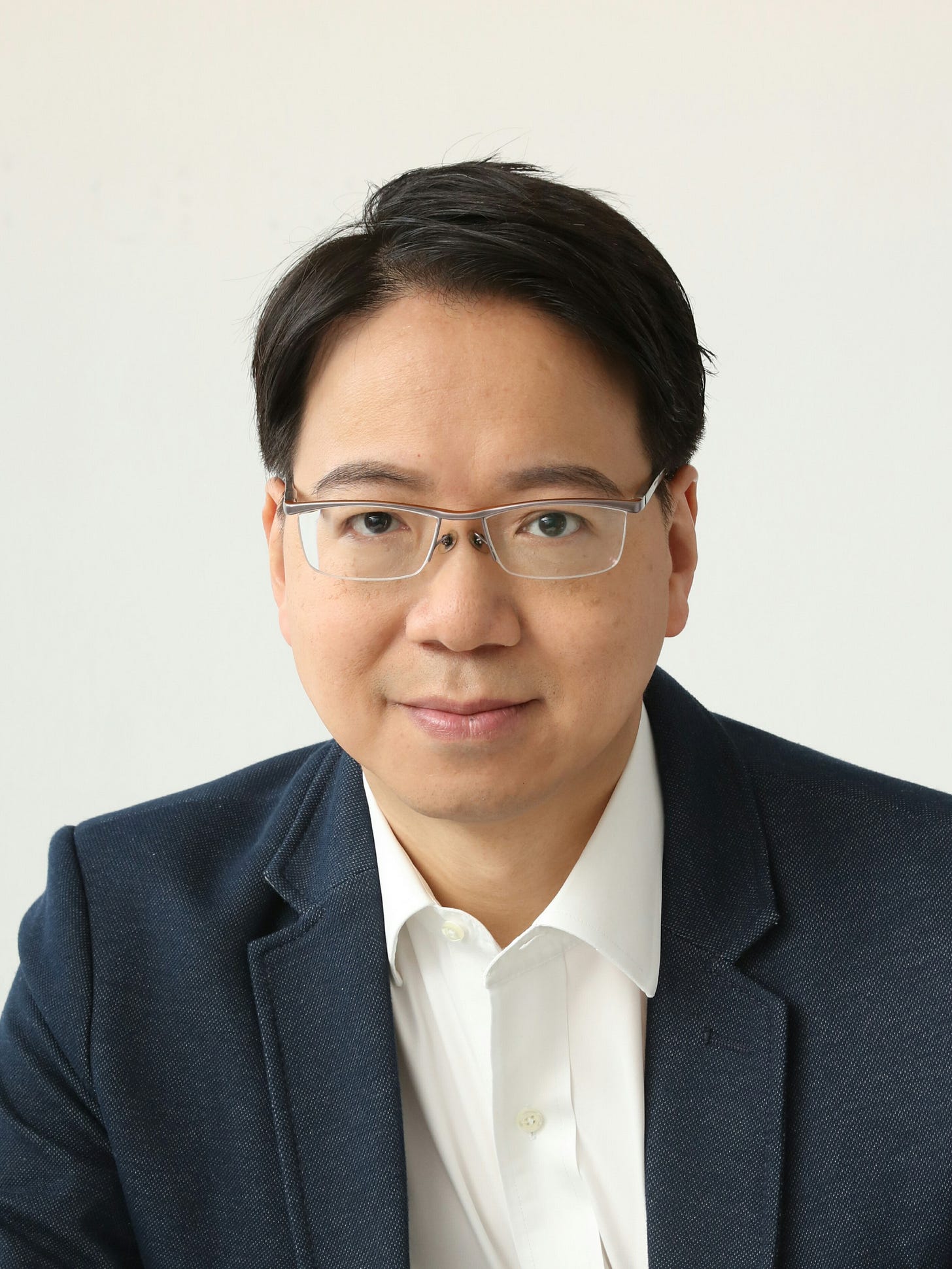The BHR Group Digital Rights Careers Newsletter - Issue 14
Dear Colleagues:
I won’t take much space away from the brilliant insights of our guest practitioner, Charles Mok. I’ve known Charles since the mid or late 2000s. Neither of us could remember the exact year, but we agreed we were introduced by our mutual friend and star digital rights advocate Rebecca MacKinnon. Once you meet Charles, the puzzle pieces come together quickly. Human rights advocate, entrepreneur, policy-maker, technical expert, leader. He’s deeply principled and practical and so smart, measured, and kind. And he’s a lifelong learner, as you’ll see.
I love this lesson for all of us that Charles shares: “We made an impact, with persistence lasting more than a decade, but the work did not end there. Another lesson is learned – new threats will arise, the fight will not end, just as technology development and innovation do not stop.” For the students among you, this advice from Charles is gold: “These days, I am glad to see many undergraduates having double majors or even more – science and engineering majors crossing over into social sciences, or humanities and law students taking computer science classes, and more. The more diverse, the better. Follow your interests. Take chances, try something new. Finding your way is not a waste of time. And you have a lot of time.”
Want a window into what drives Charles’ advocacy? Look no further: “More than ten colleagues of mine in my eight years in the Hong Kong legislature, along with many other friends and comrades in democracy, are now on political trial, after having been incarcerated for more than two years, waiting for this trial. They did not work on digital rights in particular, but we all share the same belief in justice, dignity, and truth. I think of them every day.”
And I’ll leave you with this career advice gem from Charles: “Do not limit your circle to those in your own sector. Find forums where you can know and interact with people with similar interests from different sectors – private, public, technical, civil society, government, academia, or others. You never know what you can learn from others with a different background and where you may cooperate with them on common issues or interests. Be international, especially if you live in a large and dominant country, like the U.S., or China, that may make you become more inward looking only. There is still a lot more out there that affects the wider world outside, and also your world inside.”
If I were you, I’d read his answers carefully now and then keep a copy on your digital shelf for easy reference. I’m doing that. Pull them down in the days and years ahead for insights on so much – advocacy, perseverance, resilience, commitment, teamwork, learning, and leadership. Thank you, Charles.
Michael Samway
The Business and Human Rights Group
Website: www.thebhrgroup.com
Guest Spotlight: Charles Mok
Charles is a Visiting Scholar at the Global Digital Policy Incubator of the Cyber Policy Center at Stanford University, a member of the Board of Trustees of the Internet Society, and a board member of the International Centre for Trade Transparency and Monitoring. Charles served as an elected member of the Legislative Council in the Hong Kong Special Administrative Region, representing the Information Technology functional constituency, for two terms from 2012 to 2020. In 2021, he founded Tech for Good Asia, an initiative to advocate positive use of technology for businesses and civil communities. As an entrepreneur, Charles co-founded HKNet in 1994, one of the earliest Internet service providers in Hong Kong, which was acquired by NTT Communications in 2000. He was the founding chair of the Internet Society Hong Kong, honorary president and former president of the Hong Kong Information Technology Federation, former chair of the Hong Kong Internet Service Providers Association, and former chair of the Asian, Australiasian and Pacific Islands Regional At-Large Organization (APRALO) of ICANN. Charles holds a BS in Computer and Electrical Engineering and an MS in Electrical Engineering from Purdue University.
What are some of the most formative periods or events in your life, personal or professional, that shaped or shapes your work in technology, media, and human rights?
I have taken many unexpected career turns that have led me to places I would never have imagined I could end up in, in roles I could never have thought I would undertake. After I graduated from university with an engineering degree in 1987, I worked for two large computer companies in the U.S. for seven years, before returning to Hong Kong, my birthplace and hometown, and started up one of the earliest Internet service providers there. Life as an entrepreneur at the time in Asia wasn't easy, but two things that happened helped set the course of my future. First, the government became paranoid about the Internet, something they knew next to nothing about, and wanted to regulate. We in the industry began to organize ourselves to formulate codes of conduct and self-regulation on issues such as unsolicited spam messages and illegal content. These experiences made me realize the importance of policymaking and helped orientate my future political career.
At the same time, working with the budding Internet technical community in Hong Kong at the time, we began to see the importance of organizing the users in order to defend our digital rights, educate the technical community, and develop digital literacy for the masses. So, in 2005, we established the Internet Society Hong Kong Chapter, and I was the founding chair. Seventeen years later, in 2022, I was elected to serve as a member of the Board of Trustees of the Internet Society by the chapters around the world.
In 2008, I ran for the Hong Kong's Legislative Council -- the lawmaking body of the Special Administrative Region -- to represent the Information Technology sector, for the first time. I ran because Hong Kong had one of the freest Internet environments and the most liberalized telecom regulatory regimes in Asia, and I wanted to protect it. We were also facing huge challenges in updating our privacy and copyright laws, enacted before the Internet became so prevalent, and I wanted to find the right balance to safeguard our privacy. Most of all, I wanted to dismantle the undemocratic system we elected our legislature, where half of it consisted of representatives of industries, companies and professionals, including the seat I ran for (in order to remove it), and give Hong Kong people the one-person, one-vote democracy that we deserve.
In that election, I lost by 35 votes, less than 1 percent of the total votes cast. Undaunted, I ran again in 2012, and won, and was re-elected again in 2016. In those eight years, we successfully opposed a controversial digital copyright law that would have criminalized online derivative works and limited free expression, but without fair use protection for the users. I also pushed for a better government open data regime, and advocated for the legislations for open information and archival of information -- alarmingly absent for an advanced economy like Hong Kong.
In 2020, I decided to step down and not run for re-election. In retrospect, it was a timely and fortunate decision, because on July 1 of that year, the Chinese central government enacted the National Security Law over Hong Kong, setting off a new era of draconianism and repression. All pro-democracy legislators were ousted, and many of them -- my friends -- were arrested, prosecuted and jailed.
I was most fortunate that in 2022, I was invited to join the Global Digital Policy Incubator of the Cyber Policy Center in Stanford University as a Visiting Scholar. I now work on state digital authoritarianism such as surveillance and censorship, especially in the Asia Pacific area. Everyday, I remind myself of what happened to Hong Kong, how the city with the freest Internet in the world can be turned around so quickly to become one of the most oppressive, and what we must learn from it, to safeguard and take back our freedom.
Who are some people or an individual you’ve met during your work in this field who have profound influence on your work? And in what way?
More than ten colleagues of mine in my eight years in the Hong Kong legislature, along with many other friends and comrades in democracy, are now on political trial, after having been incarcerated for more than two years, waiting for this trial. They did not work on digital rights in particular, but we all share the same belief in justice, dignity, and truth. I think of them every day.
What are some of the values, broadly speaking, that guide you in this field or in life more generally?
Technology is a part of everyone's everyday life, everywhere. As such, the values that are important for digital rights should be the same as for human rights in general. If human rights principles call for universality, indivisibility, equality, non-discrimination, participation and accountability, with emphasis on the freedoms of expression, thought and conscience, it should be no different for the Internet, and our digital rights. If these rights should be universal, then we must fight against the practice and further attempts by more and more governments to fragment the Internet, limit digital rights of their own people, and even try to advance these controls, surveillance, censorship and disinformation beyond their own borders.
What’s a specific event or time when you feel like your team’s or organization’s work was able to make a significant impact in the field of digital rights?
It is hard to say that this must be a change with the most significant impact, but it was certainly the sweetest victory, because we fought against it for so long, and it looked at first so difficult to win, and yet...
There was a law in Hong Kong called "access to a computer with criminal or dishonest intent," under Section 161 of the Crime Ordinance. For a long time the police used the basis of this law to arbitrarily arrest and prosecute people allegedly committing crimes -- from relatively mundane and petty offenses to sexual crimes such as taking up-skirt photos, to serious cases of hacking -- as a "catch-all" offense. One problem was that the vague language in the law allowed prosecution to gradually not only expand the definition for what constituted a "computer" to not only smartphones but even digital cameras, but also to make arrests against people for posting certain content on the Internet, including social media.
The problem, though, was that the law was enacted way back in 1993, not only before the era of the mobile phone, but indeed before the personal computer became popular. The original intent of the legislation was to target the use of a computer in the process of preparing to commit a crime. If the crime was indeed committed, there would be other offenses that can be used to prosecute, such as fraud. But over the years, the police abused the use of this law to target any "crime" if a "computer" is involved, and the government did not update the law, because of the appeal of a broad and vague (but wrong) interpretation, making arrest and prosecution easy.Over the course of ten years, I worked with other activists in Hong Kong to highlight the problems with this law. We lobbied the government to change the law, to little avail. But we also organized signature drives and other campaigns, and worked with journalists to explain the details, all to inform the public, for them to call for change. As a legislator, I put up motions for debate. Finally, in 2019, the Court of Final Appeals in Hong Kong ruled that the law should not be applied in cases where someone was using his or her own computer to "commit a crime," because that clearly would be beyond the original legislative intent of "gaining access" to what supposedly must be someone else's computer.
In the old Hong Kong, such a small victory was still possible, but it also opened the door to the new Hong Kong to enact new "cyber crime" law that would be more draconian and harmful to digital rights. We made an impact, with persistence lasting more than a decade, but the work did not end there. Another lesson is learned -- new threats will arise, the fight will not end, just as technology development and innovation do not stop.
What are some ways you think the technology, policy, cybersecurity, and legal fields can become more diverse, inclusive, and equitable in composition, policy topics, and advocacy?
For technology and cybersecurity policymaking to be more diverse, inclusive and equitable, just make the process more diverse, inclusive and equitable. Although that sounds easier said than done, the multi-stakeholder model that has been embraced by the Internet governance community in the last 25 years is an imperfect but shining example that works. But today, there is a tendency for politicians, the media and the public to equate big tech companies with the Internet and technologies that need to be governed. In a way that is not entirely wrong, because the balance of tech power has no doubt shifted in favor of a smaller group of a handful of big tech players. Surely something needs to be done about that, but the more imminent danger though is that when governments get their hands on Internet and tech governance, authoritarian governments will seek absolute control on all aspects from technology standards setting to complete content control, and even democratic governments can easily fall to the allure of populism (such as taking away encryption for everybody in order to "prevent crime," as in the U.K.'s Online Safety Bill). And these governments all give lip service to multi-stakeholderism, but in practice they are sidelining other stakeholders -- civil society, technical community, businesses, users of all kinds. This is the most existential threat faced by the Internet, and will lead to the fragmentation of the global network as we know it. Making sure everyone knows they have to be involved to defend a free, open, safe, secure and resilient Internet is of the utmost importance now, to prevent this "network of networks not controlled by any government" from falling into the hands of, yes, governments.
For undergraduate or graduate students reading this, what type of courses or activities (e.g., internships, summer jobs) do you think might be most helpful as they contemplate careers in technology, public policy, media, and human rights?
I believe in interdisciplinary education. But I was old enough to have been stuck in the old education system of picking a major and only having a small number of so-called electives, where we just took the easiest non-core courses in order to graduate. I studied electrical and computer engineering, and although I am proud of my technical background and have no regrets, a lot of times I still wonder if I can do as well or even better if I took law, medicine, political science, or even history.
These days, I am glad to see many undergraduates having double majors or even more -- science and engineering majors crossing over into social sciences, or humanities and law students taking computer science classes, and more. The more diverse, the better. Follow your interests. Take chances, try something new. Finding your way is not a waste of time. And you have a lot of time.
For current practitioners in this field, and given your own career experience, what are some considerations when deciding whether to change sectors, say from civil society or academia to the private sector or to government? Or from the private sector to government or civil society?
I started my career in the "industry" -- an engineer for big tech firms, from the old Route 128 in Massachusetts to California's Silicon Valley. Then I moved back to Hong Kong, and ended up starting up my own company, in a place where tech usually gets little respect. Then I started trade associations with other Internet service providers on the one hand, and user and civil society organizations on the other hand. Then I moved into electoral politics. Now, I entered academia.
Some of these moves were accidental, some intentional. It may be easy for me to say that I follow my instincts, but I think I was also following what I think needs to be done, for the wider good of the community. One thing to do is to organize. When I was in the Internet service provider (ISP) industry, we saw that we needed a bigger and more unified voice to talk to the regulators. We organized (the trade associations). When I left the industry, I saw things more from the user's angle, the public good. We organize (Internet Society Hong Kong Chapter). To run for political office, I also had to organize the professionals in the sector to support not only my candidacy but more importantly our vision for our city -- freedom, democracy, equality and fair competition.
Do not limit your circle to those in your own sector. Find forums where you can know and interact with people with similar interests from different sectors -- private, public, technical, civil society, government, academia, or others. You never know what you can learn from others with a different background and where you may cooperate with them on common issues or interests. Be international, especially if you live in a large and dominant country, like the U.S., or China, that may make you become more inward looking only. There is still a lot more out there that affects the wider world outside, and also your world inside.
Positions in Policy, Law, and Digital Rights
Civil Society/Non-Profits
Communities Communications Coordinator | Access Now (Multiple Locations)
Senior Policy Analyst / Counsel (East Asia) | Access Now (Multiple Locations)
Fall 2023 Undergraduate or Graduate Algorithmic Justice Internship | ACLU
Lead Counsel, Global Privacy and Compliance | Ashoka
Academic-year Externships | Center for Democracy & Technology
Deputy Director, Free Expression Project | Center for Democracy & Technology
Staff Attorney - Civil Liberties | Electronic Frontier Foundation
Free Press Managing Director | Freedom Forum
Head of Brand and Creative Content | Global Witness (UK)
Associate General Counsel | Human Rights Campaign
Resident Fellowships Program | Integrity Institute
Generative AI Specialist | Internews
Program Associate, Multi-Regional Program Management Unit | Internews
2023 Fellowship Program | Iran Cyber Dialogue (ICD)
Race & First Amendment Special Counsel | NAACP Legal Defense Fund (LDF)
Consultancy -- Emerging Technology Challenges | National Democratic Institute
Global Indicator Database Analyst | National Democratic Institute
Program Coordinator | OpenArchive
Technology Accountability Advocate | Public Citizen
Director of Government Affairs | Public Knowledge
Principal Product Manager, Wikimedia Enterprise | Wikimedia Foundation
Press/Media
Elastic Search Consultant | Organized Crime and Corruption Reporting Project (OCCRP)
Research Team Intern | Organized Crime and Corruption Reporting Project (OCCRP)
AI Accountability Fellowship | Pulitzer Center
Senior Manager, Tech & Innovation - Policy Research & Insights | The Economist Group
Boards
Deputy Head of Data & Implementation | Oversight Board
Academia
Assistant/Associate Professor of Ethics and Public Policy | Duke University
Doctoral researcher / PhD student privacy in the metaverse | Friedrich-Alexander-University
PhD Student (4 Positions) - Philosophy/Ethics of AI | Friedrich-Alexander-University
Executive Director of the Knight Foundation, Georgetown University Institute | Georgetown University
Tenure track in data law | KU Leuven
Lecturer in Digital Cultures | Newcastle University
Open Rank Professor in AI and Social Justice | Northeastern University
Research Scientist, AI Ethicist | Northeastern University
Assistant Professor, Computational Social Science | Northwestern University
Assistant/Associate Professor, School of Journalism (Multiple Positions) | University of Arizona
Research Fellow, The Future of Free Speech | Vanderbilt University
International Organizations
Associate Director, Communications, DIAL | United Nations Foundation
Chief Executive Officer, Digital Impact Alliance | United Nations Foundation
Head of Information and Communications Technology Industry | World Economic Forum
UN Innovation Network Intern | World Food Programme (Switzerland)
Think Tanks/Research Institutions
Assistant Director, Cyber Statecraft Initiative, Digital Forensic Research Lab | Atlantic Council
Nonresident Fellow, Artificial Intelligence, Forward Defense | Atlantic Council
Summer Research Fellowship in Law & AI 2023 | Legal Priorities Project
Science and Technology Innovation Program (STIP) Internship | Wilson Center
Multi-Stakeholder Organizations/Initiatives
Chief Operations and People Officer | Partnership on AI
Chief Programs Officer | Partnership on AI
Director of Partnership Development | Partnership on AI
Government
Williams Fellowship | Administrative Conference of the United States
Sr. Advisor of Digital Equity & Inclusion | City of Detroit
Manager (Digital Access and Inclusion) | Infocomm Media Development Authority (IMDA) (Singapore)
Media Literacy Coordinator | Ofcom (UK)
Online Media Literacy Coordinator | Ofcom (UK)
General Counsel | U.S. Agency for Global Media
Presidential Innovation Fellow | U.S. General Services Administration
Industry
Corporate Counsel, Lawful Intercept Compliance, Project Kuiper | Amazon
Program Manager/Privacy, Ring Privacy Operations | Amazon
Security Response Manager, Security Incident Response Team (SIRT) | Amazon
Senior Content Policy Manager, Prime Video Trust & Safety | Amazon (India)
Public Policy Manager, ISR - 6 Month FTC, AWS EMEA Public Policy | Amazon (Israel)
Customer Service Manager, AWS Trust and Safety | Amazon (South Africa)
Corporate Counsel, AWS Energy, AWS Legal | Amazon (Spain)
Policy Enforcement Specialist | ByteDance (Japan)
Information Technology Counsel | Canon
Legal Counsel, Product & Privacy | Canva (Australia)
Trust & Safety - Technical Program Manager of Hosted Content | Cloudflare
Head of Emerging Markets, Compliance | Coinbase
Government Affairs Intern | DiDi
Director, Global Product Counsel | eBay
Sr. Mgr. Federal Government Relations | eBay
Business and Human Rights Counsel | Ericsson (Sweden)
Director I, Assistant General Counsel, EU Privacy | Etsy (Ireland)
Sanctions Investigator | Etsy (Mexico)
Senior Manager, Offensive Content | Etsy (Mexico)
Chief Privacy Officer | Experience AI Solutions
Legal Counsel and DPO | Fortytwo (Malta)
Vice President of Compliance | Galaxy (Bahamas)
Associate General Counsel | Gemini
Data Protection & Privacy Office - Strategy & Monitoring | Gojek (Indonesia)
Creator Policy Experience Lead, YouTube Trust and Safety | Google
International Government Affairs Manager, Government Affairs & Public Policy | Google
Manager, Trust and Safety | Google
Rapid Response Director, YouTube Trust and Safety | Google
Regional Legal Counsel | Google (India)
Associate Legal Counsel, Regulatory and Investigations | Google (Ireland)
Senior Counsel, Content Legal | Google (Ireland)
Public Policy Lead, YouTube (English, Japanese) | Google (Japan)
Senior Manager, Government Affairs and Public Policy | Google (Japan)
Head of YouTube Business Public Policy | Google (Singapore)
Policy & Intel Analyst | HII Mission Technologies
Privacy Program Manager | Meta
Director of Public Policy, Greater China Region | Meta (Hong Kong)
Research Intern - AI & Society | Microsoft
Senior Abuse & Fraud Specialist | Microsoft
Senior Manager, Public Policy in the Office of Responsible AI | Microsoft
Government Affairs Manager - Policy | Microsoft (Belgium)
Senior Government Affairs Manager | Microsoft (Germany)
Consultant – Threat Desk Analyst, Microsoft Incident Response | Microsoft (Israel)
Head of Government Affairs | Microsoft (Japan)
Senior Corporate Counsel | Microsoft (South Korea)
Cyberspace Digital Policy Training Advisor | MIDI Enterprises
Coordinator, Public Affairs - Public Policy LATAM | Netflix (Mexico)
Senior Director & Assistant General Counsel, Global Privacy & Data Protection | Pinterest
Senior Director, U.S. Public Policy | PlayStation
Corporate Counsel, Security & Privacy | PowerSchool
Legal Director, Corporate | Reddit
Product Counsel - Ads | Reddit
Senior Data Governance Lead | RingCentral
Associate General Counsel, Business & Legal Affairs - Content Distribution | Roku
Policy Manager | Salesforce (Brazil)
Senior Lead, Ads Data Privacy - Samsung Ads | Samsung
Public Policy and Government Affairs Lead | SandboxAQ
Law Enforcement Response Specialist | Snap Inc
Manager, Platform Safety | Snap Inc
Manager, US State Policy | Snap Inc
Senior Analyst, Geopolitical Intelligence and Operational Support | Snap Inc
Trust & Safety Specialist | Snap Inc (Australia)
Director, Incident Response | Sony
Stripe Privacy Fellowship 2023 | Stripe
Digital Inclusion Advisor I | The Kaizen Company
Global Child Safety Team Specialist, Risk and Response (Bilingual) | TikTok
Manager, Public Policy and Government Relations | TikTok
Music Product Counsel | TikTok
Research and Strategy PMO, Americas Public Policy | TikTok
Senior Privacy Counsel | TikTok
Public Policy Manager, Central America | TikTok (Mexico)
Advertisement Policy Intern - 2023 Start | TikTok (Singapore)
Content Moderation Team Leader - Singapore, Trust & Safety | TikTok (Singapore)
Law Enforcement Emergency Response Specialist, Spanish Speaking, Trust & Safety | TikTok (Singapore)
Law Enforcement Response Team - Child Safety Specialist (Vietnamese Speaking) | TikTok (Singapore)
Trust and Safety Advisor (Contractor) | Tripadvisor
Legal Counsel, Advertising, Data and Technology Counsel | VIZIO
Sr. Policy Research Associate | Wattpad
Responsible AI Senior Program Manager | Workday
Data Privacy Attorney | Zimperium
Industry Associations
Research, Policy and Advocacy Coordinator - Gender Equality | Education International (Belgium)
SVP and General Counsel | News/Media Alliance
Firms/Consultancies
General Counsel | Access Partnership (UK)
ESG - Data Management and Controls, Vice President | Blackstone
Legal Counsel - Privacy | Boston Consulting Group
Senior Counsel, Ethics and Compliance | Circle
Alfred Fleishman Diversity Fellow - Corporate + Tech | FleishmanHillard
Data Privacy and Cybersecurity - Associate | Greenberg Traurig
Data Privacy Attorney | Latham & Watkins
Send open positions you’d like us to consider posting in this newsletter here: info@thebhrgroup.com
Find previous newsletter issues here.










